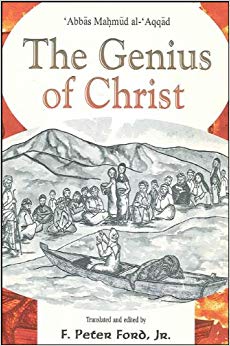Background
Abbas al-Aqqad was born on June 28, 1889, in Aswan, Egypt. His father was a money-changer originally from Damietta while his mother had Kurdish roots.

Abbas Mahmoud al-Aqqad in 1950s.

(Translation of an Arabic work extolling the person and mi...)
Translation of an Arabic work extolling the person and mission of Jesus. The main portion of this book is a translation of an Arabic work extolling the person and mission of Jesus, whose life and teachings form the foundation of the Christian faith. That its author was a Muslim, and one who wrote several other books in defense of his own faith, may seem strange for Christian readers who know little about Islam. Yet Muslim readers will hardly find this remarkable. In concert with their holy book, the Qur’an, Muslims have consistently regarded Jesus as one of the most esteemed of a long line of prophets. Like most Christians, they believe that he was born of the Virgin Mary, performed many miracles, and most importantly, was called by God to be the bearer of divine revelation to the Jews. This book virtually ignores the Islamic literature about Jesus, and instead draws almost exclusively from the New Testament, especially the four Gospels.
https://www.amazon.com/Genius-Studies-Contemporary-Philosophical-Theology/dp/1586841041
2001
journalist philosopher writer poet
Abbas al-Aqqad was born on June 28, 1889, in Aswan, Egypt. His father was a money-changer originally from Damietta while his mother had Kurdish roots.
Abbas al-Aqqad attended an Islamic elementary school, where he was taught the Koran and Arabic language. In 1899, he began his studies at primary school, but due to the strained circumstances of his family, he left school after four years. Later he supplemented his learning by reading books on his own. Al-Aqqad read about religion, geography, history and many other subjects. He also spoke English and French and was particularly well-read in German literature.
Abbas al-Aqqad started his career as a clerk in Quena in upper Egypt. In 1907 he became a journalist and started to work for Al-Garidah and later for Al Bayan newspaper. In 1908 he became the first Egyptian journalist to interview Saad Zaghloul, a nationalist leader who would one day become the country's prime minister. He also wrote essays for the magazine Oukaz. In 1930, he was sentenced to prison for his anti-government articles. After being released from prison, he began to work for Al-Muqtataf and remained there until 1956.
Abbas al-Aqqad published his first diwans, or collections of poems, titled Bits and Pieces and Shazarat. During the 1920s al-Aqqad wrote a book called A Daily Resume, which was an autobiographical account of his experiences. He tried his hand at scriptwriting in 1931, producing The Song of the Heart, which became the fourteenth film to be produced in Egypt. Al-Aqqad wrote more than a hundred books on philosophy, religion, and poetry, along with a philosophical study of the Qur'an and various biographies of historic Muslim leaders. One of his books was translated into English as The genius of Christ in 2001.
Abbas al-Aqqad was an Egyptian journalist, philosopher, writer and poet who was famous for his books on philosophy and religion. He is also the author of biography books of 14 religious figures. Al-Aqqad was known as a "human encyclopedia" of modern Arab culture. In 1960, he received the prestigious State Recognition Award.
(Translation of an Arabic work extolling the person and mi...)
2001Abbas al-Aqqad was well known for his self-confidence, especially in his political position either in his writings in different newspapers or in his engagement with the 'liberal conventionalist party'. He defied despotism and called for destroying the highest head in the country if it outbreaks the Egyptian 'Convention'. As a result, he was sent to prison for a few months for the accusation of insulting the personality of the Egyptian king.
Abbas al-Aqqad was a traditional thinker. He viewed Islam as a religion appropriate to modern life. He defended the traditional image of Islam and tried to prove Koranic assumptions by a scholarly historical method. Notwithstanding his moderation, he was charged by the Islamic radical, Sayyed Qutb, with inappropriate recourse to non-Islamic sources in order to explain Islamic thought. In Qutb’s opinion, he betrayed the progressive reformism of Muhammad Abduh.
Al-Aqqad also had great respect for women, wrote three books on the subject, insisting in each of them that women should have the right to participate fully in society, and opposed to the severely restricted role they were relegated to in orthodox Islam. He argued that women should enjoy the freedom of thought as well.
Quotations:
"The mind is not a vessel to be filled, but a fire that must be kindled."
"I am vainly biting on a hope that does not want to stay with me!"
Abbas al-Aqqad was a member of the Academy of the Arabic Language in Cairo.
Abbas al-Aqqad had two major romantic relationships in his life. The first was with a woman whom he called "Sarah" in his novel of the same name. His second romantic relationship was with the famous Egyptian actress Madiha Yousri. This relationship was ended by al-Aqqad himself, because of Yousri's career as an actress. Later al-Aqqad wrote a poetry work about this relationship called Cyclones of a Sunset (A-Asiru Maghrib in Arabic).
